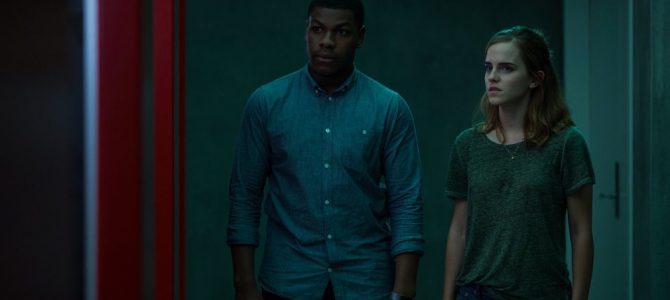
Dystopian fiction has been hot for years, perhaps now especially. Donald Trump’s election pushed George Orwell’s “1984” to the top of bestseller lists, and fueled interest in Hulu’s recent adaptation of Margaret Atwood’s “The Handmaid’s Tale.”
But amid a genre obsessed with riffing on twentieth-century fascism, Dave Eggers’ novel “The Circle” stands apart. The nightmarish vision it depicts—captured in this new film adaptation—draws far more from Aldous Huxley’s “Brave New World” than Orwell’s “1984.” Eggers’ dystopia isn’t something thrust upon us by scheming leaders, but something we collectively choose.
In many ways, the film version of “The Circle” plays out like an extended episode of Charlie Brooker’s “Black Mirror” TV series: a study of how the technologies we unthinkingly accept may ruin us. As the film opens, bright young HR employee Mae Holland (Emma Watson) takes a new job at “the Circle,” a Silicon Valley tech company bent on “connecting the world” through a universal online ID system.
With charismatic Steve Jobs stand-in Eamon Bailey (Tom Hanks) at the helm, the Circle is rolling out a new product called SeeChange, a global network of cameras designed to “promote total accountability.” After a kayaking accident nearly claims her life, Mae volunteers to become the first “fully transparent” Circle employee—wearing a live-streaming SeeChange camera at all times. Unintended consequences, as you might expect, result.
The Film Diverges From The Book, To Its Detriment
There’s a lot to like here, even beyond the obviously compelling themes involved. Director James Ponsoldt (responsible for 2015’s outstanding “The End of the Tour”) conjures up a memorable vision of saccharine, poison-laced utopia. Emma Watson makes, as ever, a suitably winsome lead (even if she can’t quite shake a “British aristocrat” demeanor), and Tom Hanks is great as always. John Boyega (of “Star Wars: The Force Awakens” fame), Karen Gillan, and Patton Oswalt also put in appearances.
Given the quality of talent it musters, it’s a shame “The Circle” is so wildly uneven from a storytelling standpoint. The movie’s disastrously bloated screenplay abandons the “show, don’t tell” maxim in favor of endless exposition dumps, particularly early on. The book’s pitch-black ending is bowdlerized in favor of a conventional Hollywood finale, robbing the story of its most biting edge.
Most frustratingly of all, the movie collapses the novel’s far-reaching social critique into a story primarily centered on mass surveillance. There’s a great scene at the beginning where Mae slowly realizes that she’s actually enslaved to a host of “optional” after-work social opportunities, internal “popularity scores,” and customer “performance algorithms”—but sadly, these plot threads are dropped immediately thereafter. In an age where an ill-advised tweet can summon forth death threats from digital mobs, the “radical openness” envisioned by “The Circle” is a truly skin-crawling possibility. It’s a shame such dread isn’t allowed to linger.
Themes Remain Poignant, Despite Storytelling Faults
But cinematic foibles notwithstanding, “The Circle” remains a brutal exploration of an American totalitarianism voluntarily adopted: technocracy taken to its logical, literal conclusion. Its themes, more than its moviemaking virtues, take center stage.
The film’s power stems from its sheer plausibility: it’s impossible not to recall last year’s controversy surrounding Facebook’s alleged suppression of conservative news outlets, Mark Zuckerberg’s recent proclamation that Facebook is the next step in the evolution of global community, Amazon’s ever-listening Alexa gadget, Elon Musk’s newfound commitment to brain-computer interfacing, and so forth.
Right now, intense competition between companies has kept the dystopian vision of “The Circle” at bay (that is, everything isn’t integrated under one banner), but with companies like Amazon increasingly controlling all aspects of consumer life, and powerhouses like Facebook bringing competing social networks under its banner, the hour may be later than we think. There’s a reason I still write important things down on paper, confine my innermost thoughts to private conversations, and spend money on non-“cloud” goods and services (David Sax’s recent book “The Revenge of Analog” explores this in greater depth).
“The Circle” also depicts an insidious conflation of business with government—a lethal cronyism that demolishes barriers between corporate money and state authority. Many talented writers on both right and left have explored the increasing misalignment of values between corporate America and American civil society; with these considerations in mind, even “pro-business” conservatives should be willing to engage in this conversation, pushing back against the intermingling of political power with private, self-serving interests. (Maybe privately designed “electronic voting systems,” authorized by copyright laws to shield their source code from public view, aren’t all they’re cracked up to be.)
‘The Circle’ Is a Conversation Starter
Perhaps, in a curious way, the movie’s odd emotionlessness and endless discussion scenes actually work to its advantage. This is, after all, a story about the fundamental transformation of the human experience. Were the Circle’s vision to come about in real life, it would probably start like this: an unfolding series of densely worded, matter-of-fact statements (or TED talks?) about massive paradigm shifts to come. Viewed through that lens, some of the film’s discombobulated storytelling is forgivable. (I’m still miffed about the ending, though.)
In short, while “The Circle” doesn’t really do full justice to its source material, it’s still highly watchable (and eerily relevant). Its central question—where do you draw the line between your true self and the image you share with the world—isn’t an easy one. But everyone must answer it in some way or another. If nothing else, “The Circle” really succeeds as a powerful conversation starter. Three cheers for the concept, one for the execution.









